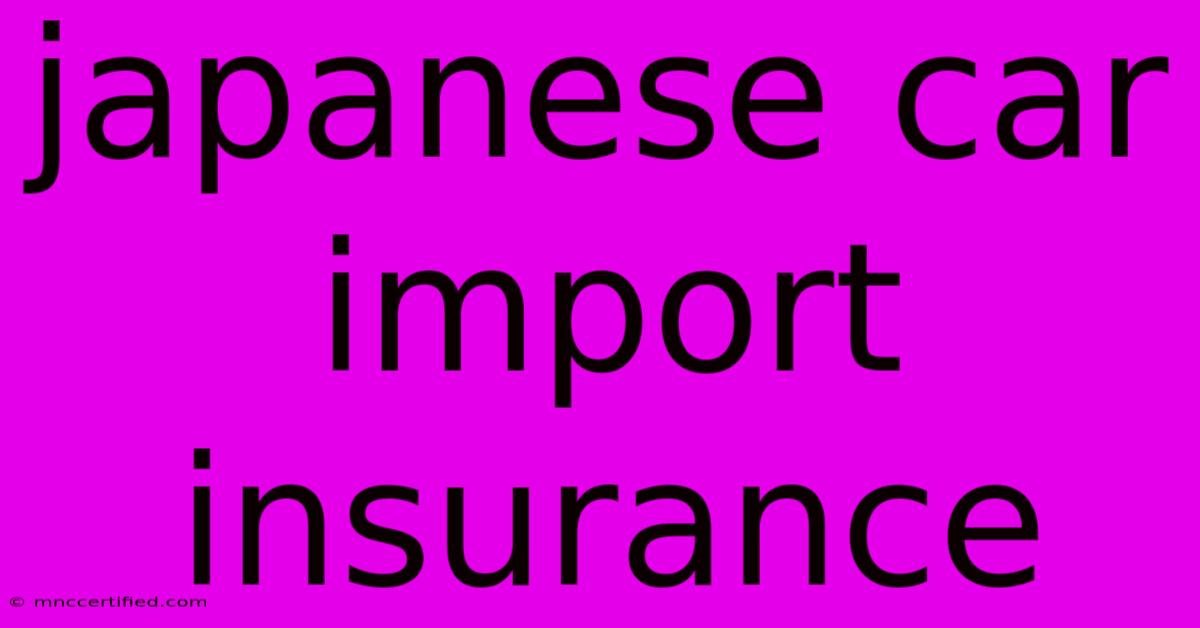Japanese Car Import Insurance

Table of Contents
Navigating the World of Japanese Car Import Insurance
Importing a Japanese car can be an exciting adventure, offering access to unique models and often better value than domestically sourced vehicles. However, before you can enjoy your new ride, you need to secure the right insurance. This guide will walk you through everything you need to know about Japanese car import insurance, ensuring a smooth and stress-free process.
Understanding the Unique Challenges of Insuring Imported Japanese Cars
Insuring a Japanese import differs from insuring a domestically sold car. Several factors contribute to this:
- Vehicle Specifications: Japanese cars sometimes have specifications not readily recognized in your country. This might include different safety features, emission standards, or even modifications that impact the insurer's risk assessment.
- Parts Availability: Sourcing replacement parts for a less common Japanese import might be more challenging and expensive, impacting repair costs. Insurers consider this when determining premiums.
- Import Documentation: You'll need comprehensive documentation proving the car's legal import and specifications. This includes the import certificate, bill of sale, and any relevant modifications documentation.
- Vehicle History: Obtaining a clean vehicle history report is crucial. This helps insurers assess the risk and ensure the car hasn't been in major accidents or suffered significant damage. Japanese vehicle history reports may require specialized services to translate and interpret.
Finding the Right Japanese Car Import Insurance: Key Considerations
Choosing the right insurer is vital. Here's what you should consider:
1. Comprehensive Coverage:
This type of insurance covers a wide range of scenarios, including accidents, theft, fire, and vandalism. Comprehensive coverage is recommended, especially for a recently imported car that might be more vulnerable to theft or damage.
2. Liability Coverage:
Liability insurance is legally mandated in most countries and protects you financially if you cause an accident that injures someone or damages their property. Ensure your policy meets your country's minimum legal requirements.
3. Agreed Value Coverage:
This coverage option protects you in the event of a total loss. Instead of relying on the market value at the time of the loss, your insurance will pay out the agreed-upon value of your vehicle when you took out the policy. This is particularly valuable for classic or rare Japanese imports.
4. Insurer Specialization:
Look for insurers with experience handling imported vehicles, ideally those familiar with Japanese car models. Their understanding of the nuances related to parts sourcing and vehicle specifications can streamline the claims process.
5. Cost vs. Coverage:
While saving money is tempting, don't compromise on essential coverage. Compare quotes from multiple insurers, carefully reviewing the policy details before making a decision. Don't focus solely on the premium; analyze the overall value provided.
The Documentation Process: What You'll Need
Prepare the following documents before contacting insurers:
- Bill of Sale: Proof of purchase from the seller.
- Import Certificate: Official documentation confirming the legal import of the vehicle.
- Vehicle Identification Number (VIN): Essential for identifying your specific car.
- Vehicle Specifications: Detailed information about the car's make, model, engine, and other relevant features.
- Proof of Address: To confirm your residency.
- Driver's License: Your valid driver's license.
Tips for Securing the Best Rate on Your Japanese Car Import Insurance
- Maintain a Clean Driving Record: A history of accidents or traffic violations can significantly increase your premiums.
- Consider Safety Features: Cars with advanced safety features might qualify for discounts.
- Compare Multiple Quotes: Get quotes from several insurers to find the best deal.
- Bundle Policies: Some insurers offer discounts if you bundle your car insurance with other policies, like home or life insurance.
- Pay in Full: Paying your premium upfront can sometimes result in a discount.
Importing a Japanese car can be a rewarding experience. By understanding the specifics of Japanese car import insurance and following the steps outlined above, you can ensure your new vehicle is adequately protected and you can enjoy the open road with peace of mind. Remember to always read your policy carefully and clarify any ambiguities with your insurer before signing.

Thank you for visiting our website wich cover about Japanese Car Import Insurance. We hope the information provided has been useful to you. Feel free to contact us if you have any questions or need further assistance. See you next time and dont miss to bookmark.
Featured Posts
-
Middleton William Honor Queen Liz
Nov 29, 2024
-
Europa League Nice Vs Rangers Tv Channel
Nov 29, 2024
-
Ex Tory Mp Jenkyns Defects To Reform
Nov 29, 2024
-
Thanksgiving Day Starbucks Open
Nov 29, 2024
-
Convicted Spy Escaped Soldier Iran Links
Nov 29, 2024